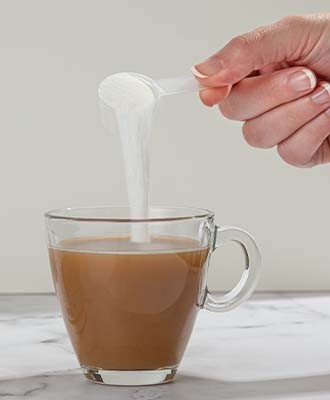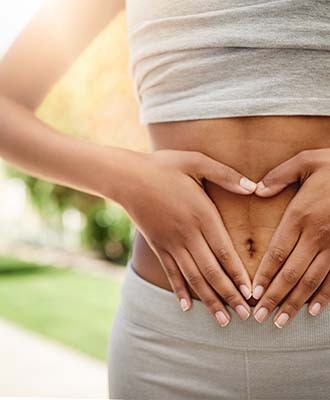Can I Put Collagen in Coffee? Know The Trends
- By Yonboon Team
- December-12-2023
Are you trying to figure out how to get more collagen in your body? Your morning cup of coffee holds the key.
But the question is— how can I put collagen in coffee?
We have this detailed guide formulated for you focusing on the health benefits of adding collagen to your daily coffee regimen.
Benefits of Combining Collagen and Coffee
Jennifer Aniston, a superstar and the epitome of health and wellness, starts her day with collagen coffee.
Most of the collagen supplements are in the form of powders, shots, blends and capsules. The substance is usually marketed as collagen peptides when variations of other healthy ingredients such as vitamins and biotin.
These components, along with collagen, are effective in promoting joint health, improving skin hydration, nails and hair health.
Read more: Multifaceted Benefits of Collagen: Revitalize Your Health & Body
How Does Collagen Take? Will Collagen Alter the Taste of My Coffee?

Most collagen supplements are unflavored, odorless in their pure form so if they are mixed with something else like coffee or smoothie, they are often undetectable.
Some of the collagen supplements are flavored (check our citrus flavored marine collagen powder). It’s ideal for people wanting to drink the supplement on its own for a quick dose of vitamins and other useful elements.
A few of the flavored collagen could complement the overall flavor of coffee. And for this reason, some companies have started producing collagen coffee creamer that is ideal for adding to your morning coffee.
Can High Temperature Damage Collagen Structure?
Collagen powders are a perfect fit for coffee as they dissolve easily. There are a few debates going around regarding adding collagen to hot coffee.
Is that even possible? What about the molecules that deteriorate from the heat?
Will the hot temperature break down the collagen structure?
The main problem with adding collagen into your coffee could be the impact of high temperature on the supplement’s quality. We know that proteins get denatured (a minor structural modification) when they are exposed to acidic/alkaline medium or intense temperatures.
However, the hydrolyzed collagen is already in the form of a partially digested substance; thus, enhancing the absorption of supplement in the digestive system.
Here you need to know one vital fact: collagen may undergo additional protein breakdown (aka degradation) if it is exposed to higher temperatures. The protein may no longer perform its basic function making the supplement ineffective and useless.
Let’s clear this with some research-based facts…
Well, according to recent research, it’s safe to consume collagen coffee if the temperature is under 302°F.
Collagen protein starts to degrade at about 302°F (150°C). Well, the usual temperate range of brewed coffee is around 195°F to 205°F (90°C to 96°C), and this is far lower than the above temperature.
So, we can safely say that the quality of the collagen powder is unlikely to be impacted as long as your coffee is below 150°C (at the time you add your collagen supplement).
Read also: What Does Collagen Do for Your Skin?
How to Add Collagen to Your Coffee?
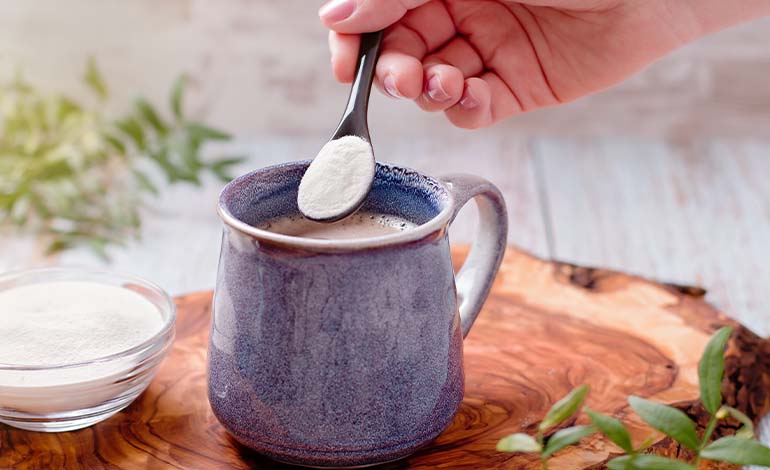
With the rising trend of collagen supplements, more and more people are interested in adding these miracle potions into their routine; especially mixing them with coffee. For most of the people, this is the ideal approach to increase the collagen amount in their daily diet.
As the unflavored form of collagen tastes neutral, it can be added to drinks and other meals without altering their flavor.
Here’s how you can add collagen to your coffee:
- Brew your coffee like you do normally.
- Add 1 to 2 scoops of our marine collagen powder in your coffee.
- Gently stir the powder until it's completely dissolved. And enjoy a healthy dose of collagen, vitamins and biotin.
Now answering the most anticipated question…
How Much Collagen Should I Add to My Coffee?
Ideally, consuming 15 gm to 20 gm of hydrolyzed marine collagen peptides are considered safe and beneficial. For starters, you can add 1 to 2 scoops of our marine collagen powder to your daily coffee. We recommend you start with smaller amounts and then gradually increase the dosage.
Related: Does Marine Collagen Work? What Does Scientific Evidence Say?
FAQs
Is it safe to add collagen to my daily coffee routine?
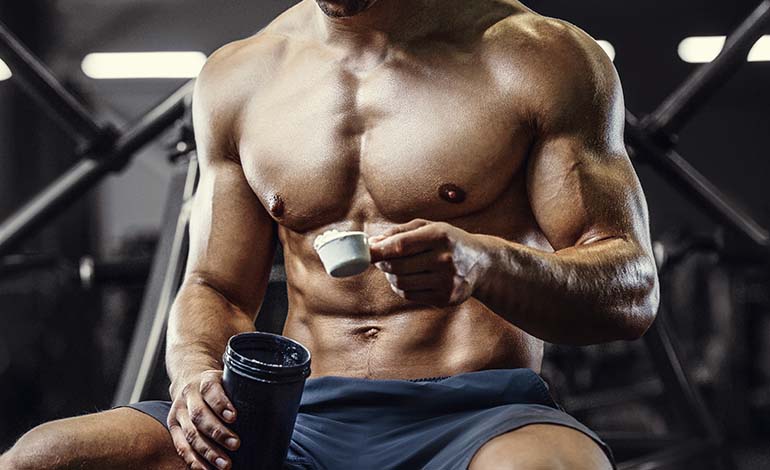
Yes. The temperature at which the collagen protein denature during brewing is typically lower than that of hot coffee. So, collagen protein can usually be added to your coffee with any risk. You can also add it to your bulletproof or buttered coffee. Plus, adding collagen to your coffee will not change the flavor because it is odorless and tasteless.
Can I mix collagen with both hot and cold coffee?
Ideally yes. You can add collagen to your coffee, be it cold or hot. But beware, the temperature of the coffee should not be more than 302°F. Also, you can add collagen to other types of hot and cold meals/drinks. The taste is normally unaffected and unnoticed.
Can I use collagen in coffee if I have dietary restrictions, like being vegan or gluten-free?
That depends on the brand/company you are using collagen supplement from. One thing to note here is that none of the collagen is entirely vegan, as they are derived from bovine or marine sources. However, most of the collagen is gluten free and accounts for such types of dietary restrictions or allergies.
Are there any creative coffee-collagen recipes I can try beyond the usual mix-and-sip method?
Here are some of the most creative and fun collagen coffee recipes that you shouldn’t miss.
- Add 1 to 2 scoops of collagen powder to your coffee and stir gently. Pour this mixture into a blender or mix it with the help of handheld milk frother (for added smoothness if you like an even creamier combination).
- Add a dash of milk, cocoa powder, coffee and 1 scoop of collagen to your cup. The cocoa powder organically sweetens the coffee and makes it more creamy and rich without being extra sweet.
- Add 1 cup of iced coffee, 1/4 quarter cup of milk, 1/3 cup of coconut cream, 1 tablespoon of cocoa powder, ice cubes and 1 scoop of collagen powder into a blender. Blend the mixture until it gets smooth. This will make a delicious frothy collagen frappe.
What other beverages can I add collagen to?
You can add collagen to a variety of drinks such as
- Protein shakes.
- Water.
- Milk.
- Smoothies.
- Juice (orange, apple, mango, etc.)
- Cold/iced tea.
Can you put collagen in coffee with milk?
Yes. You can add collagen to coffee (with or without milk). FYI collagen adds a creamy texture to your coffee that may appeal to you if you like cream or milk coffee. There are many collagen creamers available nowadays to add some extra froth to any hot cup of coffee or tea.
So, What’s the Final Verdict?
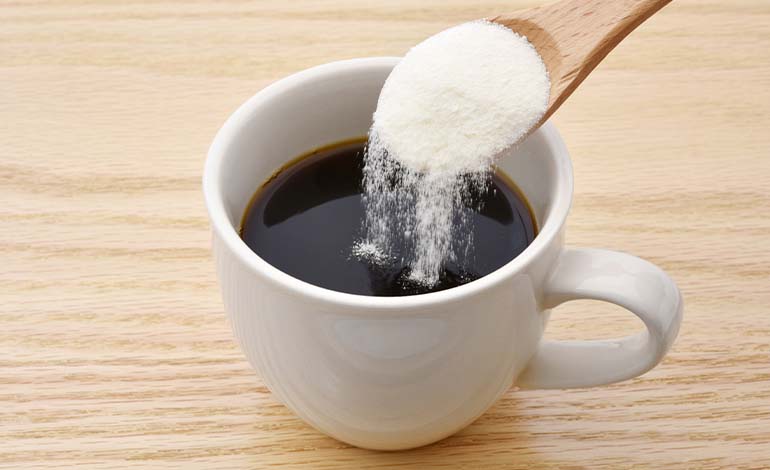
In recent years, collagen supplements—especially marine collagen powders—have gained immense popularity. They are claimed to restore overall health and body conditions, including joint health, hair and nail support and youthful skin.
Yonboon premium marine collagen is a fantastic choice as it provides an ample amount of collagen, vitamins, amino acids, biotin and hyaluronic acid.
For those who are looking to maximize coffee’s already-established health benefits, collagen coffee may be the ideal combo.
Read our wellness guide if you want to know what type of collagen is best for you to add to your morning coffee.
